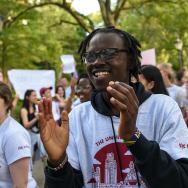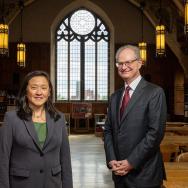As the Class of 2026 joins the University of Chicago community, six first-year students in the College share stories about their diverse upbringings, myriad of interests and aspirations for their time in Hyde Park.
Reece Baker
Reece Baker finished second in Kansas’ high school state pole vaulting competition last spring, and aspires to reach a national ranking at the collegiate level.
As class valedictorian in Lansing, Kan., Baker brings more than just athletic skills to campus, and is looking forward to all of the academic challenges the College has to offer.
“UChicago is one of the most prestigious schools not only in the United States, but in the world, and being privileged enough to be accepted here was a true honor,” she said.
Baker overcame significant adversity to reach where she is today. On July 11, 2019, at the age of 15, she was diagnosed with Hodgkins lymphoma.
Her tumor had spread along the whole length of her right lung, wrapped around her esophagus and was starting to move down her left lung. To treat a tumor that had quickly spread across her lungs, she started the first of what would eventually be 50 rounds of chemotherapy, as well as a myriad of steroids and medication.
After three months of treatment and two years of monitoring, Baker’s cancer is now in full remission.
“Coming from a strong military family I became extremely resilient, focused and disciplined,” she said. “I feel as though those attributes helped shape who I am and what I stand for.”
Outside of her athletic pursuits, Baker said she enjoys reading books by UChicago alum Kurt Vonnegut, as well as challenging herself with online French courses. She also hopes to pursue research in pharmaceutical oncology.
“Surviving cancer has prompted me to live life to the fullest and never let a single opportunity to slip through my fingers,” she said. “I am blessed to be a part of UChicago, and I appreciate all of the generous donors who made this opportunity possible.”
Rishi Basu
For as long as he can remember, Rishi Basu has been fascinated by cars. Influenced by his father, also a car enthusiast, he grew up on Top Gear UK and Car&Driver magazines and even learned mat using his favorite models’ horsepower and torque figures.
Basu’s childhood interest has evolved into a large part of his identity—one that has led him to uncover his deep passion for engineering.
During the gap year he took after high school, Basu worked for a year as a software engineering intern for Nobias Therapeutics, a pharmaceutical startup in the Bay Area, where he helped develop a machine learning platform for drug discovery. Before that internship started, he worked on the sales floor at a car dealership, where he sold 28 vehicles in two months and was in the top half of the dealership’s sales board.
Spending significant time away from home helped Basu learn the skills he needed to navigate living independently. Those skills proved useful when he began working on his first car: a 2004 Volvo C70 HPT Convertible he bought in Santa Cruz, Calif., that he used to commute to work at Nobias.
With the help of a local independent Volvo shop in Sunnyvale, Calif., and some friends at Stanford, Basu learned everything he could about the vehicle as he discovered issues and made performance upgrades.
“The process of learning and performing DIY repairs was frustrating at many times, but gradually, I grew more confident,” he said. “I realized that owning a car and giving it care (and perhaps some tasteful modifications) lets you build a bond with it similar to anything else we put effort into—relationships, work, our homes and projects of all kinds.”
Basu said his gap year was transformative. Over a calendar year, he lived in four different places, had roommates ranging from 27 to 72 years old, made friends in “the most random ways,” fell in love with San Francisco and discovered a bit about what makes him truly happy in “this great adventure that is life.”
“I truly think that more students should explore taking a gap year before college. Giving yourself the freedom to fill a chunk of unstructured time however you’d like can open up so many potential opportunities,” he said. “My last fifteen months were a gift and I wouldn’t trade them for anything.”
Alexander Bilochenko
For the past four years, Alexander Bilochenko was stationed in Yokosuka, Japan, as part of his service to the U.S. Navy. It was an experience that taught him the importance of teamwork and helping others.
“Despite political, religious, economic, ethnic, gender and other various differences, we learned how to come together and accomplish our mission,” Bilochenko said.
Bilochenko has traveled the world throughout his life – he was born in Ukraine, immigrated to Arizona at age 10 and started serving in the U.S. Navy in 2016, later visiting multiple Southeast Asian countries with his fellow sailors. He’s looking forward to spending the next four years in Chicago.
While deployed, Bilochenko read books by current and former UChicago professors Steven Levitt, Richard Thaler and Mihaly Csikszentmihalyi. He said he especially enjoys listening to Freakonomics Radio, a spin-off of the book that Levitt co-authored with the same name.
"As my military obligation neared its end, I did a lot of soul-searching and decided that it was time to join the intellectual giants who had already taught me so much," he said.
With his naval contract scheduled to end in October, Bilochenko applied to UChicago, drawn to its nationally top-ranked Veteran Scholars Program, as well as the Kenneth C. Griffin Department of Economics and Booth School of Business. He became even more steadfast in his decision after seeing UChicago’s support of the Ukrainian community following the Russian invasion.
On campus, Bilochenko plans on majoring in economics with the ultimate goal of building a career at the intersection of behavioral economics, brain-computer interface and geopolitics. He also plans on waking up early for Kuvia, a cherished winter tradition for College students.
“Self-improvement and fulfillment are both extremely important to me,” Bilochenko said.
Lincoln Crockett
Whether he is biking, hiking, canoeing or camping, Lincoln Crockett spends much of his time outdoors.
He first dabbled in these activities as a Boy Scout, where he gained an appreciation for the environment at an early age. Now an Eagle Scout, Crockett has a passion for environmental advocacy.
Crockett is involved with many local campaigns and non-profit organizations in his family’s hometown of Belmont, Mass. This past summer, he worked as a canvasser for the Massachusetts Public Interest Research Group on the Better Bottle Bill campaign, which is aimed to modernize the state’s bottle bill and reduce plastic in the environment.
“This is an issue I care deeply about, as we have a lot of plastic that doesn't get recycled the way it could or should,” said Crockett. “There is clear proven legislation that has worked in other states that could be easily implemented here in Massachusetts too.”
He has also worked on a campaign for 100% renewable energy, which he believes “is one of the most important fronts we have to make progress on when it comes to fighting climate change and promoting environmental wellbeing.”
One of Crockett’s greatest efforts in environmental advocacy was the invention he and his friends created a few years ago. They filed a patent for a device that would measure the amount of water in artificial snow on ski slopes and provide feedback to the machines and operators that would allow them to adjust their output and reduce water use.
In addition to environmental advocacy, Crockett also invests much of his time into the arts, specifically theater. He greatly enjoys performing and writing plays, and is excited to explore the art scene in the city as well as the many classes and organizations UChicago offers.
“I hope at UChicago I'll be able to develop my skills and learn about everything that I couldn't learn about on my own,” he said.
Victoria Feng
Growing up, Victoria Feng and her family lived in five different states, eventually settling into the northwest suburbs of Chicago, where she attended high school.
While her childhood was spent in various locations, Feng said a constant through all of it was writing. In middle school, she joined the Scholastic News Kids Press Corps, a national journalism program for children ages 10-14 that publishes “news for kids, by kids.”
In sophomore year of high school, Feng started working professionally as a freelance journalist, and has had her articles published in the New York Times, WIRED, Business Insider. She has won multiple journalism awards at the state and national levels, and aims to continue her journalism career once she finishes college.
“I started writing as a means of expressing myself,” she said. “Now, I’m drawn to journalism in particular because of the opportunity to investigate issues I’m passionate about and ones that affect readers.”
Feng said she chose UChicago because of its reputation for rigorous academics, and emphasis on creativity. As a student, she plans to explore her interests in the social sciences and creative writing, as well as social justice initiatives across campus and the community.
She is particularly excited to explore the UChicago campus, which she said is gorgeous and filled with exciting history in both the past and present.
“When I watched ‘Divergent’ in fifth grade, I had no idea I’d be attending the university the Erudite headquarters was filmed in and have the ability to visit the Mansueto Library anytime I wanted,” she said.
She enjoys baking and experimenting with new recipes in her free time, and is looking forward to “adding pumpkin to everything, from pie to muffins” this fall.
Benjamin Swerdlow
When the COVID-19 pandemic struck, Benjamin Swerdlow used his extra hours at home to start volunteering for the World Health Organization’s (WHO) COVID-19 App Collective. The collective worked on an app designed to inform the general public about news and developments related to the pandemic.
After developers working with WHO gave him the opportunity to build a prototype, Swerdlow, from Santa Monica, Calif., coded 5,000 lines in just two days. He was eventually promoted to overall technical lead, a position that taught him more than just technical skills.
“Bruno Bowden [the project lead] showed me how to work with teams even when I didn’t understand every part of the work, but can still help to bring them together,” Swerdlow said.
A coder since elementary school, Swerdlow was the first minor to join Hack for LA, a volunteer team that works with partner organizations to improve Los Angeles, which he did after launching his first app freshman year. He rose through the ranks to become its project manager.
“I wanted to go to UChicago to be a part of a community where people have uncommon ideas that we can build together,” Swerdlow said. “It seems like a place where I can learn from people who bring their own experiences from all different backgrounds.”
Swerdlow is also the CEO of a startup called Backyard Events, a web-based event management platform. At UChicago, Swerdlow is thinking of double majoring in law, letters and society and cognitive science. Given his interest in coding, he’s also considering a minor in computer science.
“I’m excited to compete in UChicago’s hackathon,” Swerdlow added. “The first hackathon I went to was a few weeks before COVID started, and I haven’t been to an in-person hackathon since.”

